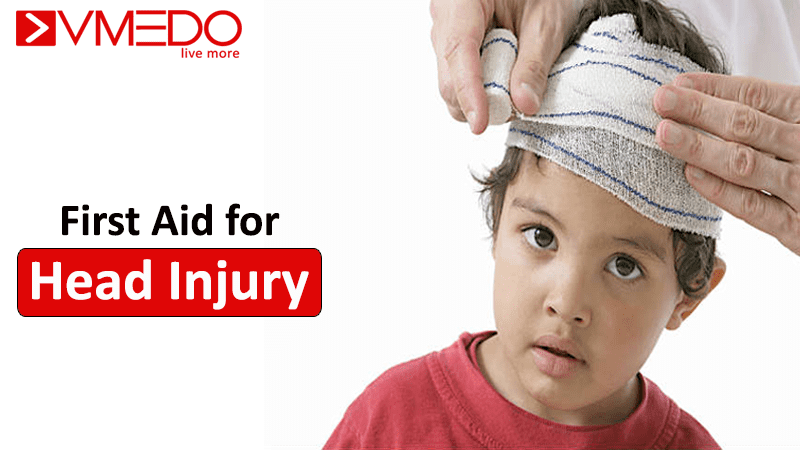For any moderate to severe head injuries call for medical help right away. While waiting for medical ambulance you need to Know These First Aid Steps for Head Injury.
1. Treat any possible wounds:
Use a clean pad & press firmly over the wound to avoid loss of blood for at least 10 minutes.
Cover the wound with a bandage.
Use disposable gloves while dealing with wounds to avoid further infection.
2. Check the victim level of consciousness by asking simple questions.
3. Reassure the person and try to keep the victim calm and provide them comfort.
4. While waiting for medical help, keep checking the person’s pulse, breathing, and level of consciousness. If the person becomes unconscious, be prepared to begin resuscitation.
DO NOT
Do NOT wash any brain injury/ head wound that is deep or bleeding a lot.
>Do NOT try to remove the helmet or any object sticking out of a wound.
>Do NOT shake the person’s head & neck, which may cause further damage.
Don’t apply direct pressure on the wound especially if its skull fractures.
Causes:
1. Accidents at home, work, outdoors, or while playing sports.
2. Falls
3. Physical assault
4. Traffic accidents
5. Explosive blasts and other combat injuries.
If the injuries are minor, skull protects the brain and if it’s severe brain injury you may need to stay in the hospital.
Prevention:
1. Falls are the major cause of head injuries. Some, like toddlers falling when learning to walk, is unavoidable. Others may be preventable, especially in the elderly. To minimize the risk of falling at home use of proper floor coverings, the use of assistive devices for elders & kids such as canes and walkers, and by evaluating homes for high-risk areas like bathrooms and stairs can help.
2. Routine use of helmets& seat belts may decrease head injury in vehicle accidents. Usage of helmets in outdoor sporting activities like skateboarding and snowboarding can help in avoiding head injuries.
3. Avoid risky & negligent driving behavior (drinking and driving, texting while driving) can avoid head injuries.
Frequently Asked Questions for First Aid Steps for Head Injury
1. What is a brain injury?
Brain injury is the damage that affects the brain cells & causes either temporary or permanent functional difficulties in the brain, possibly results in death.
2. What are the symptoms of brain injury?
Dizziness
Fatigue, drowsiness.
Ringing in the ears
Hypersensitivity to light, noise, touch, smell or taste
Loss of consciousness, confused.
A persistent Headache.
Repeated vomiting or nausea
Convulsions or seizures
3. What are the types of Brain Injury?
Mainly there are 2 types of brain injury and both affect the brain’s normal functioning.
Traumatic Brain Injury (TBI) is the alteration of brain function caused by an external force or by a trauma such as road accidents, falls.
Acquired Brain Injury (ABI) is the damage at a cellular level and many a time this is from a tumor. Ex: Stroke, Brain Haemorrhage etc.
4. What are the different types of treating Head Injury?
Treatment for head injuries depends upon the type & the severity of the head injury.
If it’s a minor injury, the pain is the main symptom at the place of the injury and you may be suggested to take any pain reliever medication. If it’s open wound, the doctor may use the bandage to cover it.
Even if it’s minor injury still you should consult a doctor to make sure that it doesn’t get worse.
You may need to hospitalize if you have a serious head injury & the treatments depend upon the diagnosis.
If you are looking for first aid, CPR, AED, and Basic Life Support training program Click here and Register.
